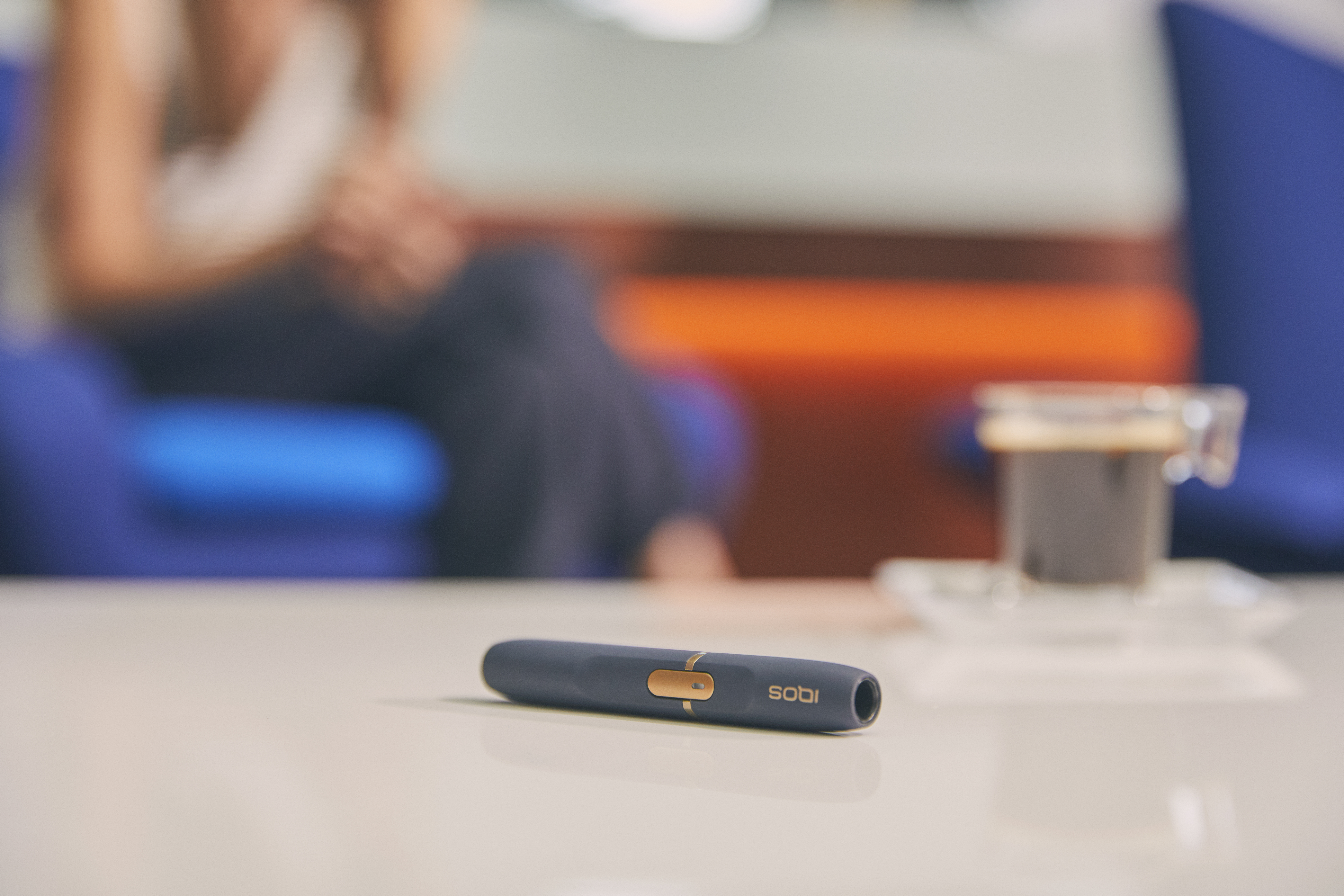Exclusive: Philip Morris boss Peter Nixon speaks to VB
February 5, 2020

Philip Morris MD Peter Nixon tells Andy Marino why the company’s heat-not-burn product is about to take off in 2020.
Peter Nixon is the MD of Philip Morris, part of PMI, the international tobacco company established nearly two centuries ago with a shop in Bond Street, and whose best-known cigarette brands today are Marlboro and Chesterfield.
But Philip Morris has big ambitions in terms of leaving smoking behind, and committed itself in 2016 to phasing out the production and sale of cigarettes with the goal of “moving to a smoke-free world,” as Nixon puts it [see PMI’s https://www.unsmokeyourworld.com/].
Since its birth in 1847 the London HQ has also moved, a little bit west to Hammersmith, and that’s where Vape Business travelled to meet Nixon on a dark and drizzly December morning, hoping for enlightenment about its e-cigarette product, IQOS, whose time he believes has come.
That’s because of an important upcoming date: 20 May 2020. If you don’t yet know its significance you are not alone. It is the fateful Wednesday when traditional menthol cigarettes become illegal not just in the UK but across Europe, thanks to the Tobacco Products Directive (TPD) the British Government signed up to in 2014, and which remains binding after we leave the EU.
Independent retailers, who greatly rely on cigarette sales and the footfall it brings with it, have already been left exposed to the nation’s declining tobacco habit – down three per cent annually for some time now. It has become an economically threatening situation for retailers that the menthol ban will make much worse.
Nixon thinks store-owners have been understandably slow to take advantage of the developing vape market that has sprung up as tobacco has died off. “The independent trade has really missed out on the whole vape thing,” Peter says. “Because it’s not really new. It’s been around about ten or thirteen years but it all went to specialty stores and online because people don’t fully understand the complexities of it.”
The variety and sheer confusion of the emerging vape scene is now being addressed by the development of pods for the mass market, along with the establishment of big and trusted brands. But retailers have been unable to begin make up the losses via vape until recently.
The upcoming menthol ban (actually a ban on all tobacco flavourings) will sharpen the situation further. With the average menthol smoker spending £56 a week in-store – and menthol smokers make up around a quarter of cigarette sales – the potential losses for independents are disastrous.
“The ban on menthol is going to have a massive impact on retailers,” agrees Nixon. PMI’s research found that the menthol ban is the most significant financial threat facing retailers in 2020. “There’s about £2 billion of value in menthol in the market, and obviously for independent retail that’s a big part of their business,” he stresses.
 Mayday, Mayday!
Mayday, Mayday!
It is not all doom and gloom, though – in fact this is a classic case of opportunity being hidden inside a crisis.
“Smokers can walk into any store, at any point, and ask for their menthol product as of May 20 and the retailer is going to have to say, ‘I can’t sell you it, I don’t have it,’” Peter warns.
The thinking has been that the 20 May ban will see 1.3 million smokers who can no longer enjoy their menthol cigarettes suddenly looking for an alternative. It’s a dramatic change, and in it the Philip Morris MD sees a big chance for both IQOS and for the independent channel as a whole to profit.
In fact Nixon believes retailers will become much more familiar with a certain three letters in 2020: H, N and B. “HNB” stands for heat-not-burn – the technology behind IQOS, which Philip Morris is betting will soon invade the e-cigarette market, becoming a potent rival to the burgeoning vape scene on our high streets.
As one of the Big Five producers, along with BAT (Vype), Imperial Tobacco (blu), JTI (Logic) and newcomer Juul, Philip Morris has been largely absent from the vape business, concentrating instead on developing its HNB alternative.
Rather than vaporising nicotine or burning leaf, specially-treated tobacco in a cigarette-like “Heet” insert is warmed – but not ignited – in the IQOS device to just half the normal temperature. The key differentiator is that HNB delivers a nicotine hit with a closer cigarette taste-and-feel than an open tank or pod vaporiser, while being similarly safe.
“Our research shows that when you heat rather than burn you reduce the chemical by 90-95 per cent, which is broadly similar to vaping,” says Peter, countering claims from elsewhere that HNB is only 70-80 per cent safer.
“That’s because you take away the burning. The problem with cigarettes is that the burning releases all the harmful chemicals. If you take away that combustion and it significantly reduces those harmful chemicals. There is a broad range of products, but they are all in the 90-95 per cent range for [the absence of] most of the harmful chemicals. HNB and vaping are broadly similar, I would say,” Peter says.
“We have just finished a six-month clinical study and I don’t think anyone else has done that for other products at the level we have done for IQOS,” he adds. “And it shows a significant reduction and a change in the smoker’s body when they switch to IQOS, which points to a significant reduction in risk.”
The company has in fact spent over £3 billion on R&D perfecting the IQOS technology because it suspects very many dedicated smokers will prefer to get their nicotine via tobacco rather than e-liquid when they switch – as they will eventually have to, because the UK government is outlawing traditional tobacco by 2030.
“The actual taste [of IQOS] is very close in terms of flavour profile to a menthol cigarette,” Peter says. “And that’s why we see that 70 per cent of the people who try heat-not-burn stop smoking completely, but with vape it’s like 20 per cent. It’s as close as you can get without actually smoking a cigarette. And there is a reason it is more successful than vaping: better nicotine delivery, closer to the cigarette experience, and it doesn’t make your clothes smell at all, actually.”
So will the menthol ban will be a good test case for whether smokers will turn to vape or look for something closer to what they know?
“What we are not seeing in all our studies is that [on 20 May] smokers will quit smoking,” he reveals. “All our numbers show us that 25 per cent of users will continue to buy their own brand but in the non-menthol variant, and 75 per cent will look for something else.”
Crunching the numbers on that, it means one million new consumers on 20 May for either vape or HNB, and Nixon thinks he has the edge.
“When we showed the smokers IQOS, 51 per cent said they would buy it. The awareness is still relatively low around IQOS, but when we show it to them and they try the product, they say, ‘Well, I would definitely buy this.’ And that is versus 20 per cent who said that they would buy vaping products.”
So at least half a million firm IQOS converts predicted by June according to the figures – and of course half a million fewer menthol cigarette customers. Luckily for retailers, Philip Morris is on the case with helping them to get hold of IQOS ahead of time.
A Different Perspective
Peter Nixon is a Londoner who studied Japanese and then moved to Japan in 2001 (he was then with accountants PwC). He married over there and was the first foreigner in the Philip Morris Japan salesforce. He was later posted to Moscow to set up IQOS in Russia – with great success.
His international experience gives Peter a different perspective on the vaping revolution. He knew the smoking world had to change, saying, “We had to disrupt ourselves because if we don’t we’ll only be disrupted by some startup or other.”
IQOS has only a tiny share of the UK reduced risk products (RRP) market at the moment, but his confidence in that changing rapidly is 100 per cent. “This can actually be bigger than Marlboro, bigger than Chesterfield,” he says.
In 2014 IQOS went on sale in Japan, where nicotine vaping is banned, and as a result HNB is already a huge market there for Philip Morris – where BAT and JTI also compete with their glo and Ploom HNB products.
Now on sale in 40 countries (PMI is the world’s second-largest e-cig manufacturer), IQOS arrived in the UK two years later, but has largely been confined to 13 city flagship Apple-style stores and so remains a rare sight in this country.
But not for much longer.
“Globally, heat-not-burn is already much bigger than vaping,” Peter explains. “If you look globally at the retail value of all alternatives to cigarettes it’s about $18 billion. Heat-not-burn has 70 per cent of that – and IQOS has 55 per cent of that 70 per cent. So we are already $10 billion. Heated tobacco will be a major category in the UK when 51 per cent of menthol smokers say they will definitely buy this product.”
Neither Ploom from JTI nor BAT’s glo is retailed in the UK, and bearing in mind the overseas success of HNB products, it seems odd. When I ask Peter why the other companies have left the UK wide open for IQOS he simply shrugs his shoulders: “Well, you’d have to ask them. I have no doubt that one day there will be competition. When it’s going to come I don’t know.”
In the case of Philip Morris, its slow, careful development and introduction of IQOS could be down to taking a long perspective on the elimination of tobacco in its traditional form. For many years, especially in the USA where the Federal Drugs Administration is all-powerful, the company has undertaken rigorous regulatory review alongside its research.
“It took us about two years and about three million pages in the submission,” says Nixon. “No one else has been through that process, and no vape has yet gone through the FDA process, but they’ll have to soon.”
Now IQOS has been rewarded with official certification in the USA just as the vape market there is suffering business-breaking bans after last summer’s black market-related deaths.
In the UK IQOS has recently succeeded in having its tax-band lowered from the cigarette to the e-cigarette category (despite being a tobacco product) meaning that it can enter the mass retail market at a price-point well below the products it aims directly to displace – dropping from £8 to £5 for a pack of Heets – meaning IQOS is half the price of a pack of regular cigarettes and almost indistinguishable in the area of “smoking” experience.
 Getting it out there
Getting it out there
In the chilly depths of winter the warmth of May might seem very distant, but plans to take advantage of the menthol ban should be made now. What is Philip Morris doing to get IQOS into the consciousness, and the gantries, of the nation’s independent sector?
“We are now giving retailers the option of selling IQOS,” announces Nixon, who says that to help the independent trade in mitigating potential damage to their business, retailers will be able to sell IQOS directly for the first time.
“We are opening up distribution, not actually through wholesale but direct to retail. We have opened an online portal [see https://menthol-ban-retail.co.uk/] where retailers can register their interest in selling IQOS and that will also provide advice and support around the ban,” says Peter.
“Up to now we’ve been worried because selling IQOS, you have to explain it a little bit. And it’s not really been easy for many retailers to explain what it is. So we have come up with technology now that will help educate retailers digitally and we have come up with technology that can help them sell the product as well.”
Previously, the cost of IQOS was similar to regular cigarettes, but as noted above, it is now considerably cheaper. To make IQOS even more competitive, a special “IQOS Menthol starter kit” will be available for retailers to sell in time for the menthol ban. The kit will include an IQOS heated tobacco device and two variants of menthol tobacco sticks.
“We can now deal with the retailers directly and actually sell to them directly. Reps will go in to support them as well,” Peter enthuses. “We are starting now to get retailers through the menthol ban. We want to be everywhere a smoker can be, asking for a menthol product – and have retailers say, ‘It’s this one! The only one I’ve got.’”
What is impressive about Philip Morris’s carefully-planned development of its HNB alternative is the reasoned view of smokers and the future implied by IQOS.
So far, the decline of tobacco has spurred on the vape industry, but Philip Morris appears to think that vapers are the “low-hanging fruit” of the smoking world: vapers never really comprised the “hard-core” of tobacco-lovers who, until now, have put up with restrictions and harassment to carry on enjoying the product they love.
Most smokers and vapers need and like nicotine, but a subset might genuinely want tobacco for the “taste and feel” of it, and will prove resistant to vaping long-term. These are the potential customers for IQOS and at the moment they aren’t even in the alternative cigarette market.
And Nixon believes these people are most smokers
“We see that 70 per cent of the people who try heat-not-burn stop smoking completely, but with vape it’s like 20 per cent,” Peter emphasises. “Again, don’t get me wrong – vaping is great and it has really helped many people, but it hasn’t worked for 70-80 per cent of the people, and those are the ones for whom I believe heat-not-burn is the solution – and it’s already bigger. I think that’s not commonly known and that people think vaping is much bigger,” he says.
“Maybe in the UK at the moment it is,” he admits, “but globally vaping is only 30 per cent of the alternatives market. Heat-not-burn is much bigger. Vaping has been really good, don’t get me wrong. Lots of people have used it and it’s helped to get them off cigarettes, but nearly everyone in the UK that smokes has tried a vape at one point, and everyone who smokes has decided they still prefer their cigarette – and that is seven million people.”
The story reminds me of Aesop’s fable of the tortoise and the hare, of how the exploding, multi-dimensional vape market was like the hare, leaping ahead – and that perhaps the HNB tortoise is plodding along the inside track now to win the race.
“If you look at our growth rates that is exactly what it looks like. Steady, gradually growing … catching up … overtaking!” Peter laughs, then laments that HNB – because it contains actual tobacco – is still at a disadvantage to vape in where and how it can advertise.
“I mean, e-cigs can advertise in different places. They can communicate in buses and billboards and all these places – I’m not saying I want to, but they can do advertising and IQOS can’t. What I would love to do is to put inserts into cigarette packs, to say to my Marlboro and Chesterfield smokers, why not switch to IQOS? But I can’t even do that,” he says.
It is certainly an eye-roller.
“It’s ridiculous, right? There are so many regulations, and I understand that they are made for cigarettes, so I get that, and they just need to be ‘unpicked’ and that takes time. I’m sure it will happen. But the quicker we can do that, the quicker we can save a million lives. There’s still seven million smokers and we forget that. It’s still the biggest preventable cause of death in the UK but it’s barely talked about.”
So your message to the nation’s retailers?
“By switching to IQOS you save money, is the first thing. And you move to a product which is 95 per cent less harmful chemicals, right? And something which people enjoy a lot. So from a product perspective I think we have an absolute winner,” Peter says.
“So a big push over the next six months to make sure that the morning it comes in, to everybody’s surprise, they can go to their local shop and see IQOS there. The retailer can say, ‘This is what you need, it’s just like cigarettes, away you go. And it’s half the price!’”
Roll on May 20.
